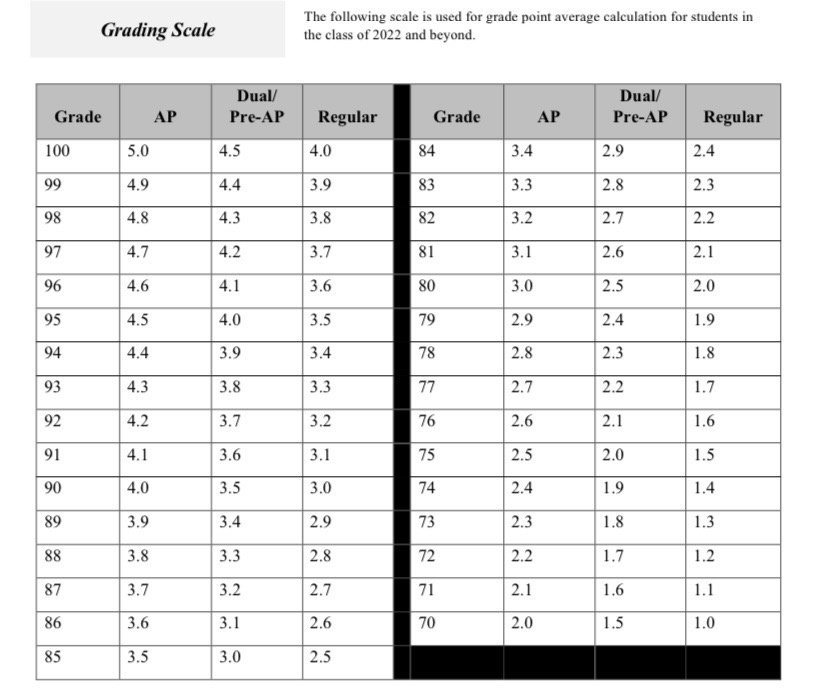How to choose courses to improve your GPA?
What are Honor & AP courses?
American high school curriculum is divided into standard (Regular) courses, honors (Honor) courses, AP courses (Advanced Placement) and IB courses (International Baccalaureate Courses). Among them, honors courses, AP courses and IB courses are usually GPA weighted because of their higher difficulty, which can improve GPA. More importantly, these courses emphasize comprehensive learning and rich personal growth, demonstrate your academic research capabilities, and are very helpful for American university applications.
Honors Program
In the American high school education system, the difficulty of honors courses is between standard courses and AP courses. Students can consider taking honors courses after completing standard courses and performing well, but not all schools offer such courses, and the types of subjects offered are also different. The more top schools offer more honors courses, however, every school The course subject selection and timing of course selection prescribed by the school may vary.
Similar to standard courses, grades in honors courses are assessed by teachers based on students’ academic performance. However, GPA for honors courses is calculated differently than for standard courses and is usually weighted. For example, some honors courses may have a maximum GPA of 4.25 or 4.5. Please refer to the policies and regulations of each school for specific scoring standards.
AP (Advanced Placement) courses
AP stands for Advanced Placement. It is sponsored and managed by The College Board. It is a difficult pre-college course offered by most high schools in the United States. It has nearly 40 courses, including six major types, STEM , English, history and social sciences, world languages and cultures, arts and studies, students can choose courses according to school regulations or their own abilities. Although AP courses are the most difficult among American high school courses, if you do well in the AP exam, you may be able to directly redeem them for college credits. The grading format of AP courses is the same as that of ordinary high school courses. The school’s teachers give corresponding grades to the course based on the student’s academic performance. These grades are recorded on the transcript and have an impact on the student’s weighted GPA.
For more explanations about AP courses, please refer to the previous article “AP Lazy Pack”
What is GPA?
GPA stands for Grade Point Average, which is the average score (average score, average grade point). In the United States, the full GPA score for general courses is usually 4.0, 4.5 or 5.0, depending on the school. For some advanced courses, such as honors courses, AP courses, etc., the full GPA score in a single subject can reach 5 or even 6 points. The calculation accuracy of GPA is usually 1 to 2 digits after the decimal point, such as 3.0, 3.45, etc.
At the same time, GPA is divided into weighted (Weighted) and unweighted (Unweighted). The main difference is whether the difficulty of the course is included in the grade calculation. For example, if your transcript contains AP, honors, or other advanced courses, then the weighted GPA will be higher than the GPA for ordinary courses with the same grades.
Unweighted GPA
Unweighted GPA is the more widely used calculation method. Typically on a 4.0 scale, the unweighted GPA is a raw score that takes into account only course grades. The biggest disadvantage of the unweighted GPA is that AP and Honors courses require more effort and skill than many standard courses, and this extra effort is not accounted for in the unweighted GPA.
What is a high unweighted GPA?
Ivy League universities generally expect applicants to have a GPA above 3.5. If a student’s high school grades were mostly A’s and A-‘s, that would likely result in a GPA of about 3.85, which is what Ivy League schools want to see. If your grades include a lot of B’s and the occasional C, your GPA may be lower than 3.5.
Weighted GPA
Weighted GPA takes into account the difficulty of courses taken on a student’s transcript. Specifically, challenging courses are graded higher on a weighted GPA than an unweighted GPA.
High schools typically assign weighted GPA on a 5.0 scale, but it may be higher. For example, if a student received an A in an AP course, they would receive a 5.0, if they received a B, it would be a 4.0, and so on. Given the difficulty of the courses, a student’s GPA may be higher than that of someone with similar grades.
What is a high weighted GPA?
Academic expectations at Ivy League colleges and other top universities are well above average; most Ivy League admitted students graduate high school with a GPA of over 4.0! This is because all Ivy League universities prioritize weighted GPA over unweighted GPA.
Q&A
Q: Do colleges prefer to review weighted or unweighted GPA?
A:Both weighted and unweighted GPA will be considered. Colleges want a comprehensive picture of the students they are considering for admission, and weighted and unweighted GPAs show how students performed both individually and comparatively. The admissions office of almost every school will recalculate the GPA based on the high school situation of the applicant. Therefore, in the final review, the GPA of all applicants will be recalculated according to a unified standard. Different schools and even different departments may have their own unique GPA calculation standards.
Q:How to calculate your GPA?
A:VALOUR provides the following URL for your reference
Average high school weighted GPA for admitted students at top universities:

Comparison of U.S. high school standard course scores and weighted AP scores:

*Each school has its own calculation ratio, this is just an example.

